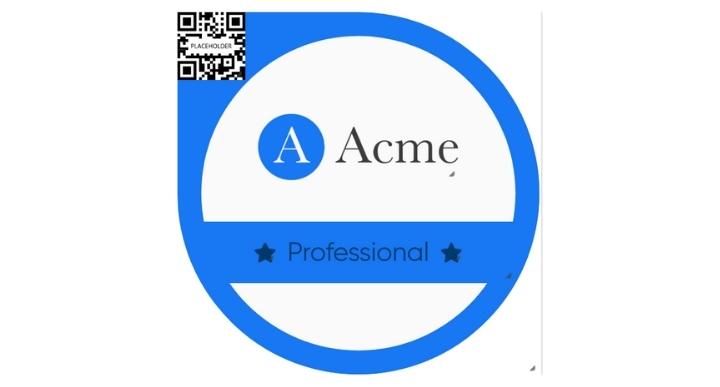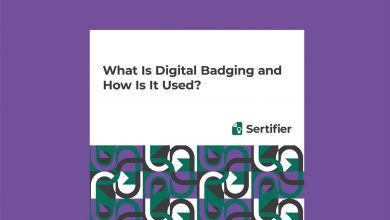Integrate Online Badges into Learning Management System
Contents
In the rapidly evolving landscape of education and professional development, traditional methods of assessing and recognizing learning achievements are being complemented, and in some cases, replaced, by innovative digital solutions. Among these advancements, online badges have emerged as a powerful tool for acknowledging and validating an individual’s skills and accomplishments. By integrating online badges into a learning management system (LMS), educational institutions, businesses, and online learning platforms can enhance learner engagement, motivate progress, and facilitate lifelong learning. This article explores the significance of integrating online badges into an LMS and the myriad benefits they offer to learners and organizations alike.
I. Understanding Online Badges: An Overview

A. Defining digital badges and their purpose: Online badges are visual representations of accomplishments, skills, or knowledge that individuals earn in various learning environments. These badges are typically issued and managed electronically, allowing learners to showcase their achievements in a digital format. Unlike traditional credentials such as diplomas or certificates, online badges are highly customizable, granular, and can be easily shared and verified online.
B. Differentiating online badges from traditional ones: Online badges offer several key differentiators compared to traditional badges. Firstly, online badges are digital representations that can be easily shared, accessed, and displayed on digital platforms, while traditional badges are physical objects that may require physical presence for verification. Secondly, online badges often come with embedded metadata, providing detailed information about the issuer, criteria, and evidence of achievement, making them more transparent and verifiable. Additionally, online badges can be linked to additional resources, such as portfolios or project documentation, enabling a richer and more comprehensive understanding of the skills or accomplishments associated with the badge. Finally, online badges can be part of a larger ecosystem, offering pathways for further learning, recognition, and career advancement, while traditional badges may have more limited visibility and potential for advancement.
C. Exploring the structure and components of an online badge: Online badges typically consist of several key components. These include the badge image or icon, which represents the achievement visually, metadata that provides additional information about the badge, such as the issuer, criteria, and evidence of accomplishment, and a verification mechanism that allows others to validate the authenticity and relevance of the badge. This structure ensures transparency and trustworthiness in the online badge ecosystem.

II. Fostering Learner Engagement and Motivation
A. Providing tangible and visible recognition: Integrating online badges into a learning management system (LMS) offers learners tangible evidence of their progress and achievements. As learners complete modules, courses, or projects, they are rewarded with online badges that serve as visible symbols of their accomplishments. These badges can be displayed on profiles, portfolios, or social media platforms, allowing learners to showcase their skills and knowledge to peers, instructors, employers, and the wider community. The visibility and recognition associated with online badges serve as a powerful motivator, encouraging learners to actively engage with the learning material and strive for further achievements.
B. Encouraging healthy competition and goal-setting: Online badges within an LMS can create a sense of healthy competition among learners. As learners see their peers earning badges for specific achievements, they are motivated to strive for the same recognition. This fosters a positive learning environment where learners push themselves to reach new goals and milestones. The gamification element of online badges, with their clear criteria and visible rewards, can ignite a sense of friendly competition and inspire learners to continuously improve their skills and knowledge.
C. Cultivating a sense of accomplishment and pride: Online badges provide learners with a tangible representation of their hard work and dedication. Each badge earned signifies a milestone or competency achieved, which instills a sense of accomplishment and pride in learners. This sense of achievement enhances learners’ self-esteem and confidence in their abilities, fueling their motivation to pursue further learning and skill development. The visual representation of badges as virtual “badges of honor” serves as a constant reminder of what learners have accomplished, reinforcing their commitment to the learning process.
By fostering learner engagement, motivation, and a sense of achievement, the integration of online badges into an LMS creates an environment that encourages active participation, continuous learning, and personal growth. Learners are inspired to push their boundaries, set higher goals, and embrace a lifelong learning mindset, ultimately benefiting both their individual development and the broader learning community.

III. Enhancing Skills Verification and Validation
A. Validating specific competencies and achievements: Integrating online badges into a learning management system enables a more detailed and precise validation of specific competencies and achievements. Traditional credentials often provide a broad overview of a learner’s knowledge or completion of a program, but online badges can validate and recognize specific skills, subskills, or accomplishments within a particular domain. By earning badges associated with specific competencies, learners can provide concrete evidence of their abilities, allowing employers, educational institutions, or other stakeholders to assess their skill sets with greater accuracy.
B. Enhancing credibility and trust in learner profiles: Online badges serve as verifiable and trustworthy credentials that enhance the credibility of learner profiles. Each online badge is associated with metadata, such as the issuer, criteria, and evidence of accomplishment, which can be easily accessed and verified. This transparency ensures that the information presented in a learner’s profile is reliable and accurate. Potential employers or educational institutions can trust the validity of the online badges, making learner profiles more credible and reliable for decision-making processes, such as hiring, admissions, or collaborations.
C. Facilitating skill-based hiring and career advancement: Online badges integrated into an LMS can significantly facilitate skill-based hiring and career advancement opportunities. As employers increasingly value specific skills and competencies, online badges provide a standardized and easily interpretable way to evaluate candidates’ qualifications. By including online badges in their resumes, online profiles, or job applications, learners can demonstrate their skills and achievements in a format that is easily recognized and understood by employers. Likewise, individuals seeking career advancement within their organization can showcase their online badges as evidence of their readiness for higher-level responsibilities or new roles.
The integration of online badges into a learning management system enhances skills verification and validation by validating specific competencies and achievements, enhancing credibility and trust in learner profiles, and facilitating skill-based hiring and career advancement. These benefits empower learners to accurately showcase their abilities and provide employers and institutions with reliable evidence of their skills, leading to better-informed decisions and increased opportunities for professional growth.

IV. Promoting Lifelong Learning and Personal Development
A. Encouraging continuous learning beyond formal education: Integrating online badges into a learning management system (LMS) promotes a culture of continuous learning beyond the confines of formal education. Online badges can be awarded for a variety of learning experiences, including workshops, webinars, online courses, or independent study. By earning badges for these activities, learners are encouraged to pursue ongoing education, stay updated with emerging trends and advancements in their field, and engage in continuous professional development. Online badges serve as a tangible incentive for individuals to embrace lifelong learning as a way to enhance their knowledge, skills, and career prospects.
B. Supporting micro-learning and flexible learning pathways: Online badges within an LMS support the concept of micro-learning, which recognizes learners’ achievements in small, specific areas of study or skills. Instead of pursuing long-term programs or degrees, learners can earn online badges for completing focused modules or mastering specific competencies. This modular approach allows learners to customize their learning pathways, focusing on the areas that align with their interests, goals, and immediate needs. By offering flexible learning pathways through online badges, LMSs empower individuals to shape their own educational journeys and acquire targeted skills and knowledge relevant to their specific career aspirations.
C. Enabling self-directed and personalized learning journeys: Online badges integrated into an LMS facilitate self-directed and personalized learning journeys. Learners can select badges that align with their interests, career goals, or areas they wish to explore. The availability of clear criteria and transparent learning pathways associated with online badges empowers individuals to take ownership of their learning, set their own goals, and track their progress. Learners can choose to earn badges at their own pace, engage in self-assessment, and pursue additional learning opportunities based on their unique needs and preferences. This personalized approach to learning fosters autonomy, motivation, and a deeper engagement with the subject matter.



